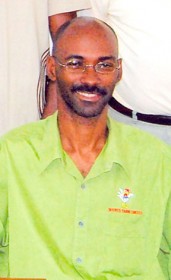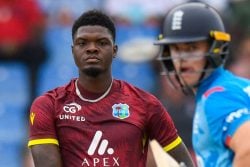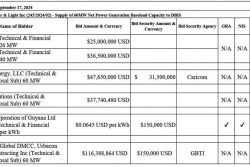-Chef de Mission of Guyana’s Commonwealth Games team Garfield Wiltshire says that Guyana’s athletes have potential, but need the required training to be able to compete with world class athletes
Chef-de-Mission of Guyana’s contingent to the recent Commonwealth Games and Treasurer of the Guyana Olympic Association, Garfield Wiltshire says that the results obtained by Guyana’s athletes at the Games can be improved in the future with the proper training.
Wiltshire, contacted by Stabroek Sport yesterday, commented on the performances of some of the sporting disciplines at the Games and suggested what will be required to bring about improvements.
The GOA Treasurer recognized the success of Guyana’s Aliann Pompey, who won bronze in the women’s 400m race and was elevated to the silver medal following a positive dope test by Nigeria’s Folashade Abugan. Abugan had placed second in the Women’s 400m event.
Wiltshire said he recognized the fact that Pompey had won the gold medal in 2002 in pointing out that this was not Guyana’s best performance.
“In some sports the performance was good, for example rifle shooting and cycling, in the case of Geron Williams placing 31st out of a field of 60 cyclists in the road race,” Wiltshire said.
With reference to Guyana’s rifle shooters, Ransford Goodluck and Mahenra Persaud, who finished just outside of the medals, Wiltshire said that this was commendable.

Goodluck and Persuad placed fifth in the pairs Fullbore Open Stage Three 1,000-yard event. Wiltshire also noted that athletes had raised their level of performance for the higher level of competition they met at the Commonwealth Games and recorded their personal best-times in the events they contested such as locally-based long distance runner Cleveland Forde and Jessica Stephenson.
Stephenson, who was Guyana’s lone swimmer at the Games, recorded her personal best-time in the heat three qualification of the women’s 50m breaststroke, while Forde posted his personal best in the male 1,500m event.
Also coming in for some praise from Wiltshire was Guyana’s table tennis team at the Games, who improved on the 13th position they occupied at the 2006 Commonwealth Games, by placing 11th this year.
In light of this, Wiltshire pinpointed that the athletes have the potential, but need the required training to take them to the level where they will be more competitive on the world stage.
“We have some good athletes, but in order to succeed on the world stage they need to train full-time, because other countries train full-time,” Wiltshire said. However, he recognized that this places the local athletes in a debacle since most of them are employed outside of their sporting disciplines and cannot afford to undertake the necessary training.
“A lot of athletes in other countries are full-time athletes and ours are not, so this places us at a great disadvantage,” Wiltshire stated.
According to him the athletes do want to compete at a higher level and if that level of competition cannot be found here efforts should be made to get athletes to compete overseas more regularly, depending on the sport.
But none of these measures to develop local athletes can become a reality without adequate funding.
In relation to the financial support obtained by outside bodies, such as the government, Wiltshire said he “cannot really comment,” but to his knowledge the government didn’t assist the GOA directly.
“They [Government] assisted in areas such as waving the airport tax, but in terms of the GOA there was no assistance towards the GOA.”
“With more assistance for the athletes they can be more dedicated to training and if the government can give assistance it would help,” Wiltshire concluded.





